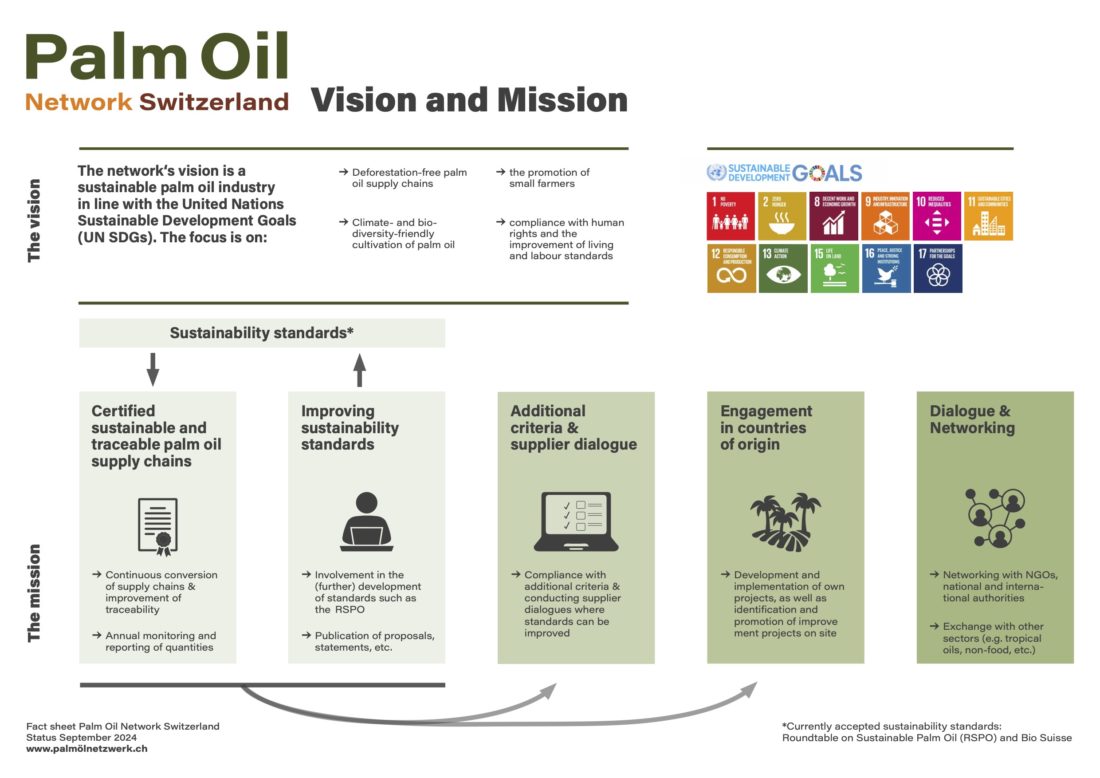
The Network
The Swiss Palm Oil Network is the competence centre and exchange platform for Swiss stakeholders involved in palm oil supply chains. Since its foundation in 2020, its purpose has been to promote the sustainability of supply chains in the palm oil sector, from cultivation and processing to the marketing and use of palm oil and palm kernel oil, as well as their fractions and derivatives.
With the Palm Oil Network, the current 12 members are joining forces to tackle the challenges and achieve improvements not just as individual companies, but with a common voice and joint activities.
For example, the goal of 100% imports of crude palm and palm kernel oil certified according to the world’s leading standard of the Roundtable on Sustainable Palm Oil (RSPO) was achieved shortly after the network was founded.
In addition, the most important main suppliers were audited for further criteria in the areas of forest protection and pesticide use, climate protection and the treatment of employees and the local population. Furthermore, some members have implemented local improvement projects aimed at strengthening smallholder structures, promoting biodiversity, optimising traceability or increasing farmers’ incomes.
Vision & Declaration of Intent
In 2024, the network underwent a comprehensive strategy process and renewed its joint Declaration of Intent.
The network’s vision is a sustainable palm oil sector in line with the United Nations Sustainable Development Goals (UN SDGs). In particular, the focus is on freedom from deforestation, palm oil cultivation that is as climate- and biodiversity-friendly as possible, the promotion and support of smallholder farmers, compliance with human rights and an improvement in living and labour standards throughout the supply chain.
The following diagram shows the network’s vision and the five fields of action in which activities are intended to contribute to achieving the vision.
Measures are to be implemented and measurable effects achieved within the framework of these areas of action as part of a continuous improvement process.
Self-Commitment of members
Specific targets and measures for members are set out in a separate voluntary Self-Commitment. This document is regularly updated and adjusted as required and by approval from the General Assembly.
Members
The members of the Palm Oil Network Switzerland are aware of the environmental and social problems that palm oil production has caused in recent years. For several years, therefore, they have been working to achieve a sustainable palm oil sector:
«Barry Callebaut has committed to source 100% of its raw materials sustainably by 2025 and already purchases RSPO-certified palm oil for almost all of the palm oil used in Western Europe. As a member of the Palm Oil Innovation Group we are actively driving further improvements of sustainability standards and transparency and are working with our suppliers on these topics.»
Massimo Selmo, Head of Global Sourcing Barry Callebaut«Coop also relies on Bio Suisse-certified palm oil for its conventional own brand food products. This palm oil comes from strictly sustainable production. Where appropriate, Coop switches to other oils and fats, if possible domestic ones. Coop also wants only sustainable palm oil to be used in the brand products it sells. To achieve this, Coop is actively engaged in the Palm Oil Network Switzerland.»
Aline Roth, Project Leader Sustainability Coop«Migros already uses RSPO-certified palm oil which also includes further criteria. We want to consistently pursue this path and achieve our goals for sustainable palm oil production together with the Palm Oil Network Switzerland.»
Bernhard Kammer, Head of Ecology & Sustainability Label Federation of Migros Cooperatives«Nestlé is working very hard to promote traceability and transparency along the palm oil supply chain. New technologies such as the satellite-based Starling monitoring system, the result of a collaboration with Airbus and Earthworm, are instrumental in assisting and enabling us to uncover or monitor illegal activities such as logging and land encroachment. Furthermore, our goal is also to make all our suppliers transparent to the general public.»
Christian Mueller, Corporate & Agricultural Affairs Nestlé Switzerland